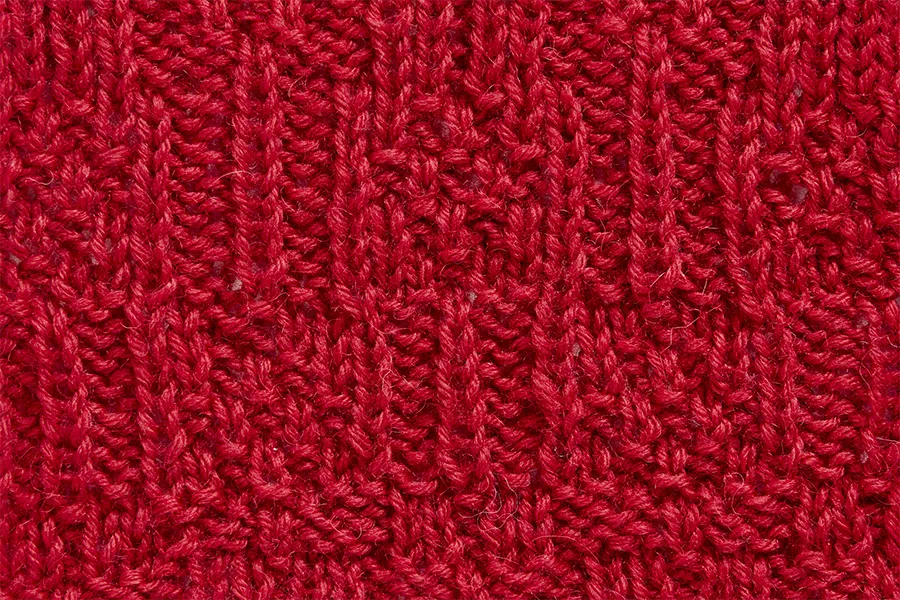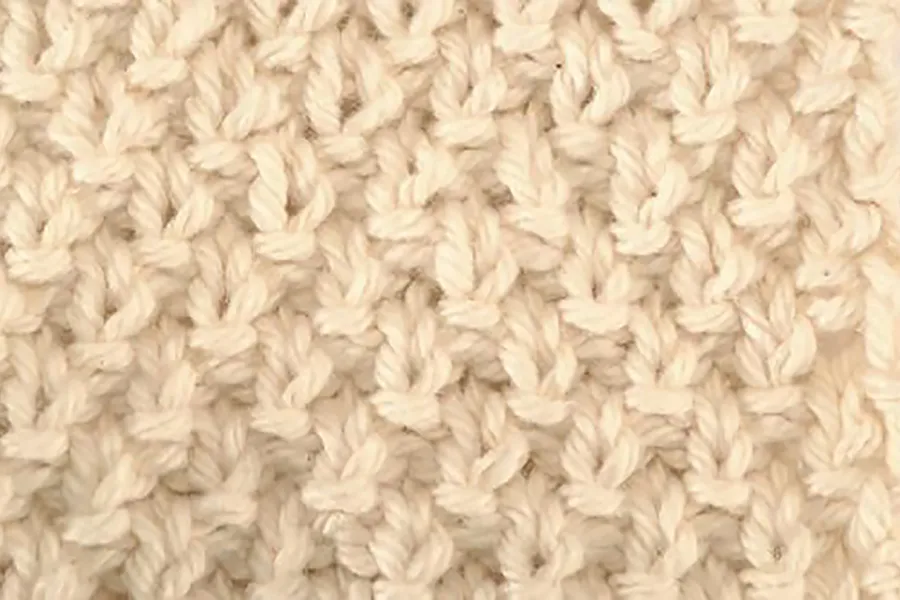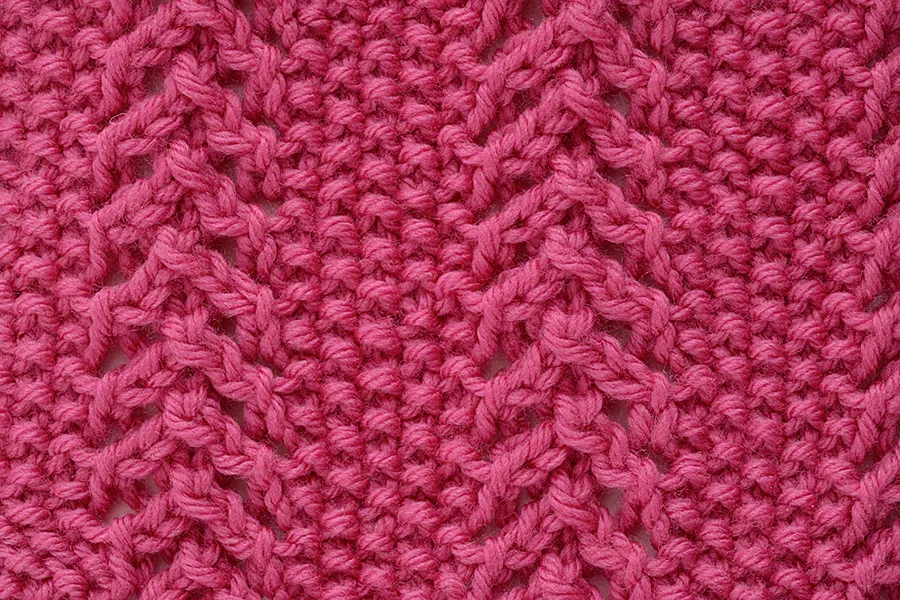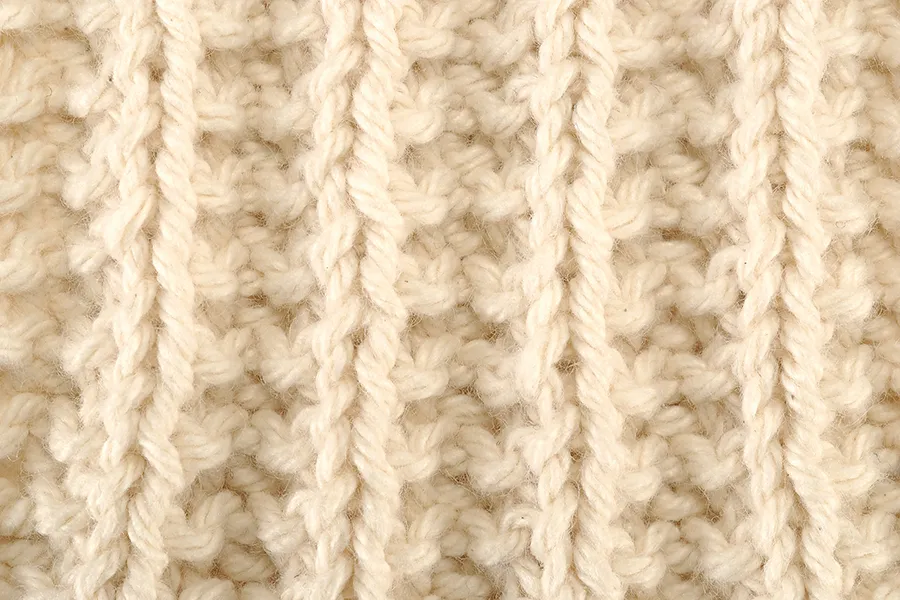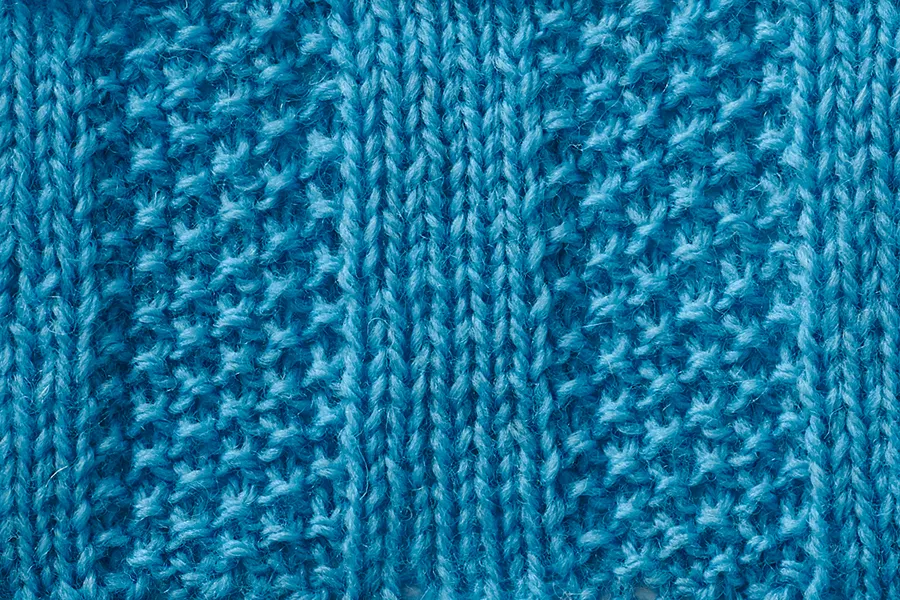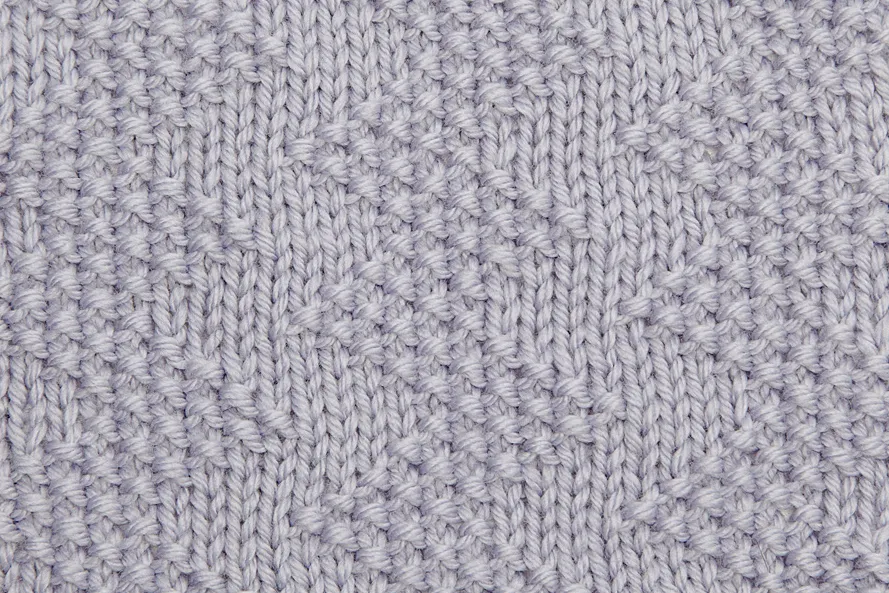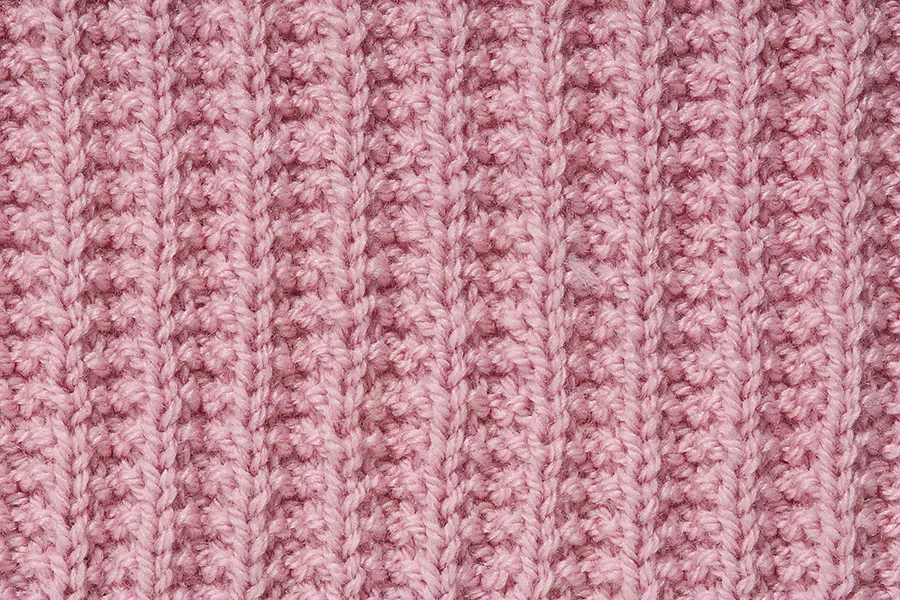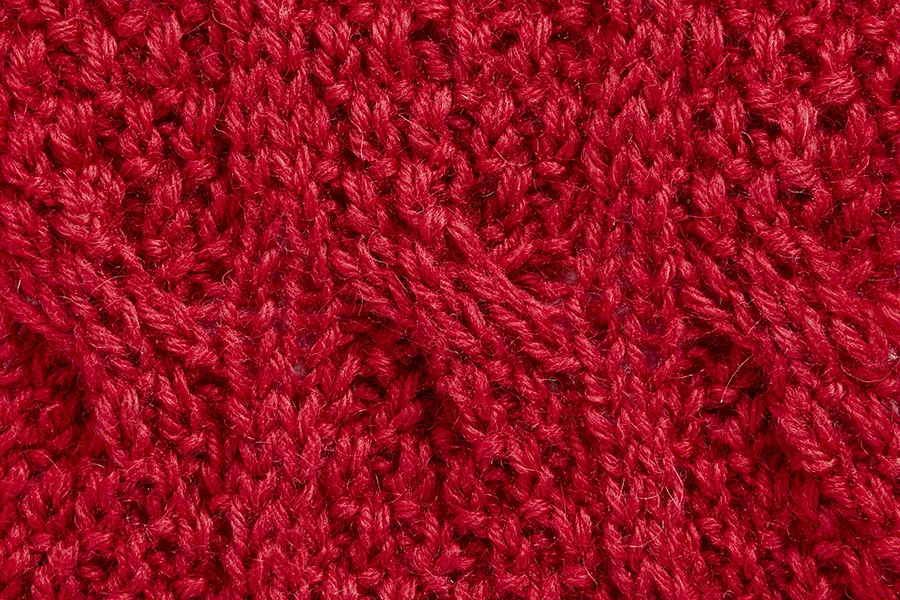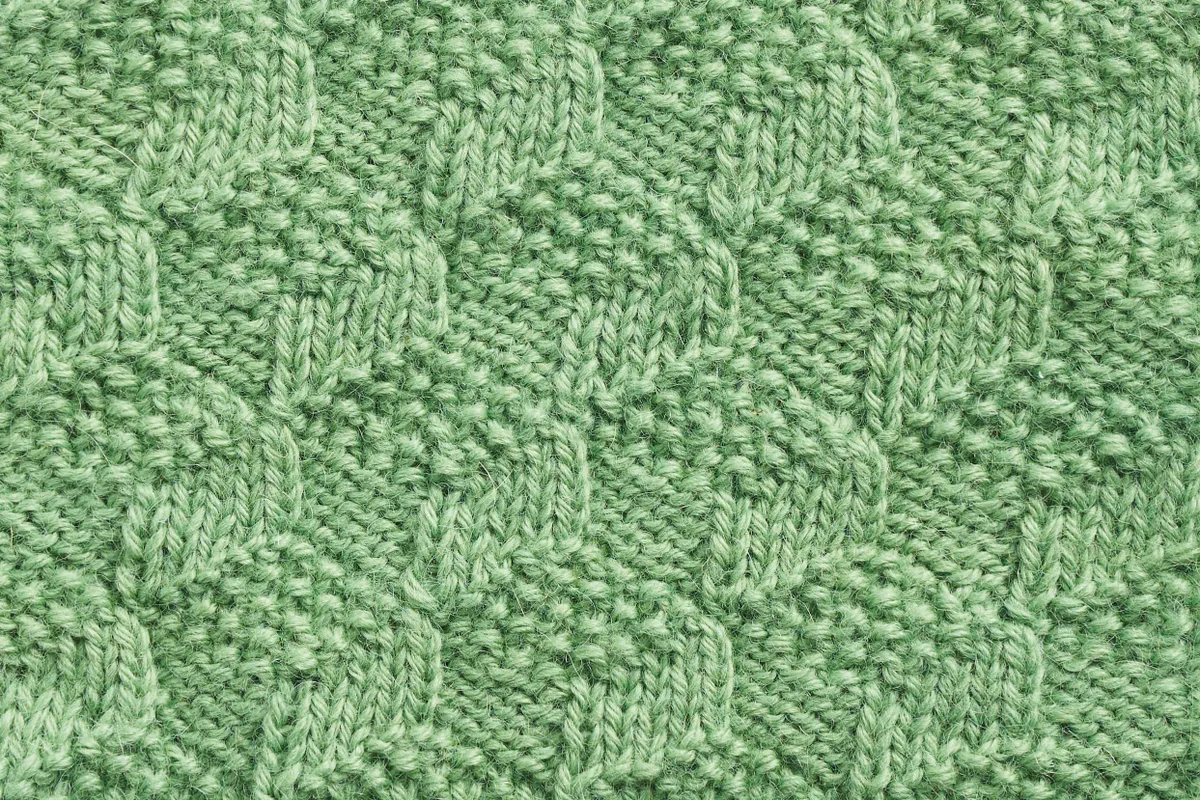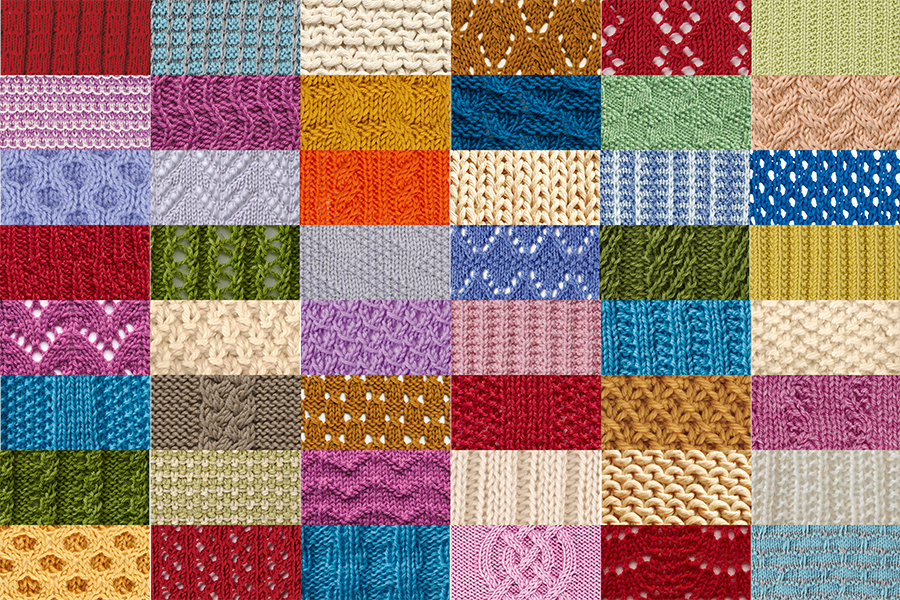You can make many different stitch patterns in knitting using just knits and purls, including moss stitch and its variations (see our knit and purl patterns for more).
The moss stitch knitting technique is super-simple but really versatile – it's both reversible and lies flat, which makes is a popular choice for garment cuffs, collars and more.
You'll often see it used on its own for its beautiful squishy texture, or combined with decorative stitches such as cables. Our guide will show you how it's done…
In this guide we have a stitch library of fantastic moss stitch knitting patterns for you to try, plus 4 easy moss stitch knitting projects to get you started. We'll also answer the following questions:
What is moss stitch?
What does moss stitch look like?
Learning how to 'read' the knit and purl stitches in your fabric will make it easier to see where you are in your moss stitch knitting pattern, and what stitch should come next.
Moss stitch knitting is reversible, so you might want to mark the right side of your knitting with a stitch marker or piece of yarn, as it can be easy to lose track of which side is which! This is how the knit and purl stitches appear in moss stitch:
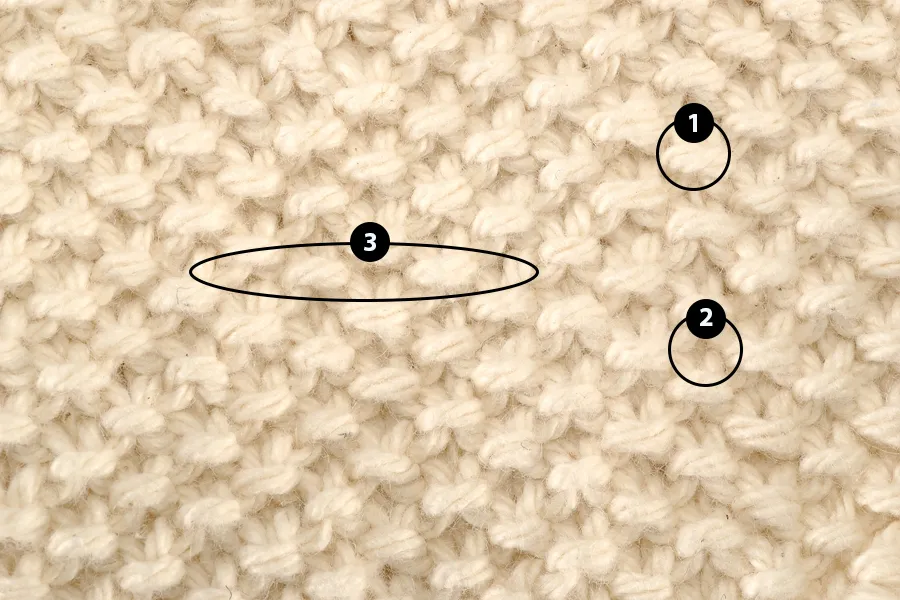
1. One purl stitch
The purl bumps are what make the texture of moss stitch, standing out from the fabric.
2. One knit stitch
On moss stitch fabric, each V-shaped knit stitch sinks into the fabric and becomes more prominent on the back. If you’re not sure which stitch you’re working next, look at whether the stitch on the row below is a V-shape (knit) or a wavy bump (purl) – then work the opposite!
3. One moss stitch row
Each row of moss stitch knitting includes a combination of knit and purl stitches. The purl stitches will look more raised than the knit stitches. When you need to count rows of moss stitch, it’s usually easier to count the rows of purl bumps on one side.
What is seed stitch?
In the US, moss stitch is known as seed stitch. So if your knitting pattern asks you to work in "seed stitch" (or "British moss stitch"), you just need to follow the instructions for moss stitch knitting below.
However, you will still see the term moss stitch used in American knitting patterns – and it means something different! Moss stitch in US terms is equivalent to double moss stitch in British terms.
Sound confusing? It can be! If you're unsure which version of moss stitch your pattern is asking you to use, first check where it was published, then look at how many rows the pattern is worked over – this should give you the clues you need to figure it out.
4 moss stitch knitting patterns to try
Practise moss stitch knitting with these easy patterns using the basic stitch. Here are four of our favourites to cast on today:
1. Moss stitch scarf pattern
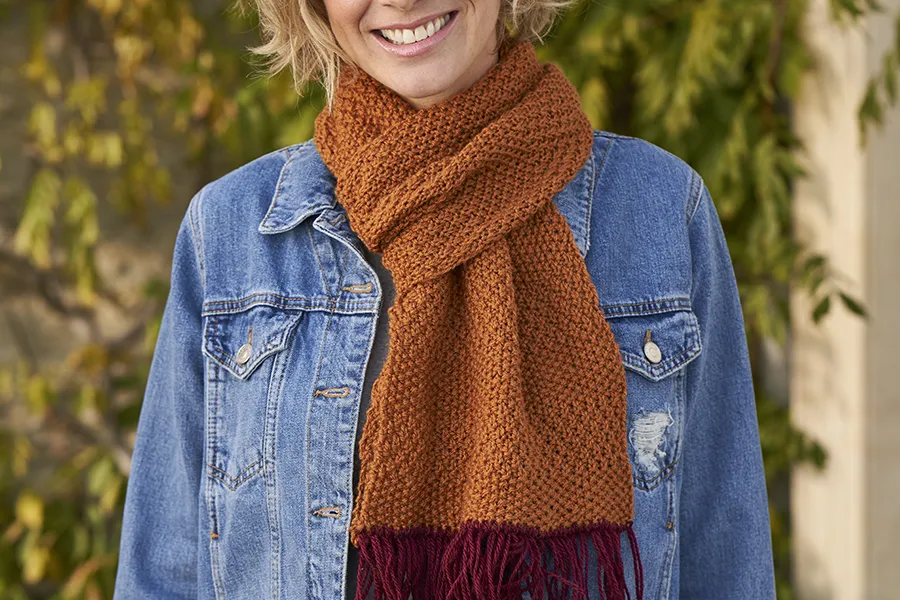
This cosy scarf uses a mix of moss stitch and double moss stitch to create cosy textured stripes. Sarah Winsper’s pattern is easy and relaxing – perfect for knitting in front of the TV!
Make the moss stitch scarf pattern.
2. Snuggly moss stitch cushion
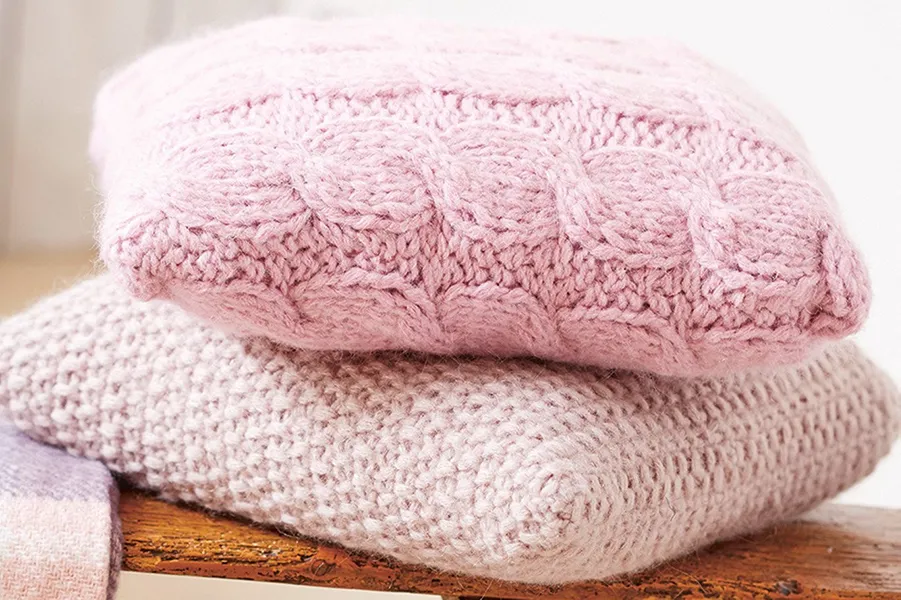
Update your home decor for the new season with a knitted cushion cover. Choose from moss stitch and cable versions in this pattern from Woman’s Weekly.
Cast on a moss stitch cushion with The Knitting Network.
3. Easy chunky blanket pattern
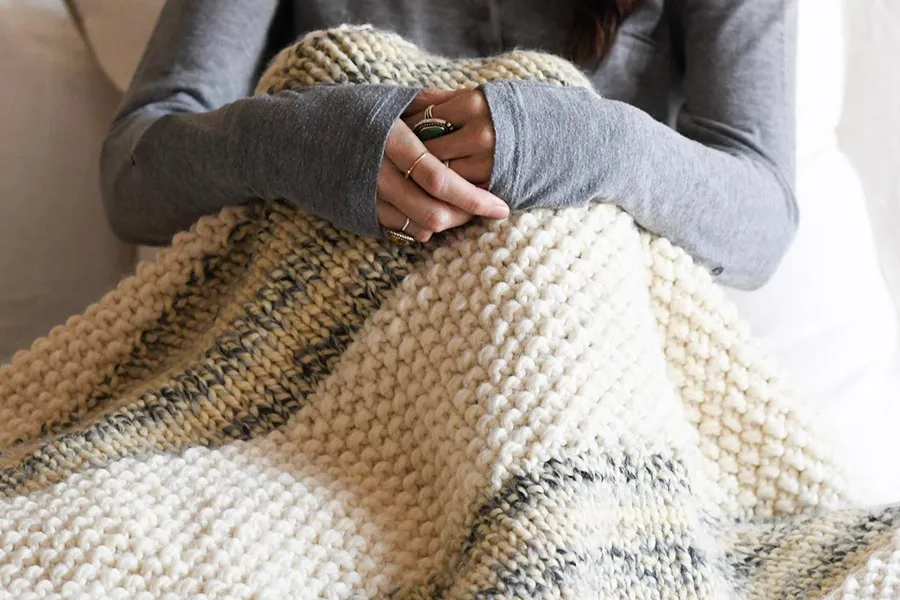
A trio of simple stitches makes this blanket from Mama In A Stitch a timeless classic. Cast on using chunky yarn and 10mm needles for a project that works up in a flash.
Find the moss stitch knitting blanket pattern on Etsy.
4. Colour block scarf pattern
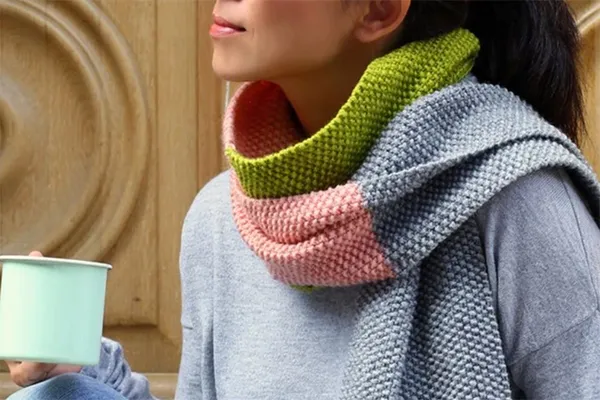
Bring some fun to your winter wardrobe with a playful pompom scarf knitted in bright colours. The gorgeous textures of moss stitch take centre stage in Ayda Algin’s simple but effective design.
Get the colour block scarf knitting pattern.
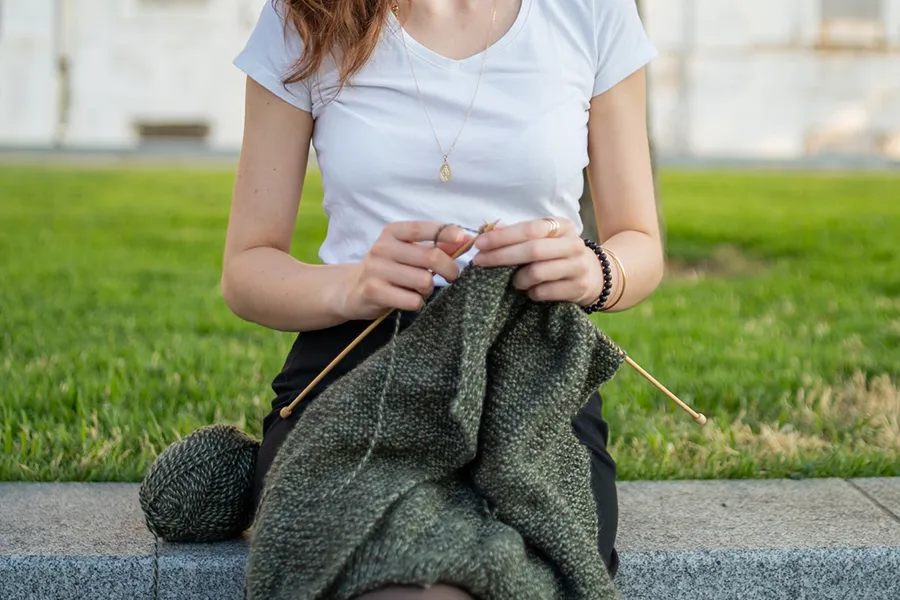
More beginner knitting tips
Get to grips with the basics of knitting with our guides. See knitting for beginners for all you need to know to get started.
Moss stitch knitting patterns: stitch library
Try these moss stitch knitting variations to add texture to your knits. From classic double moss stitch (a great choice for quick-knit scarves and blankets) to patterns combining moss stitch with lace, cables and more, there’s something for everyone.
Why not make a square in each stitch and sew them together to create a moss stitch sampler throw?
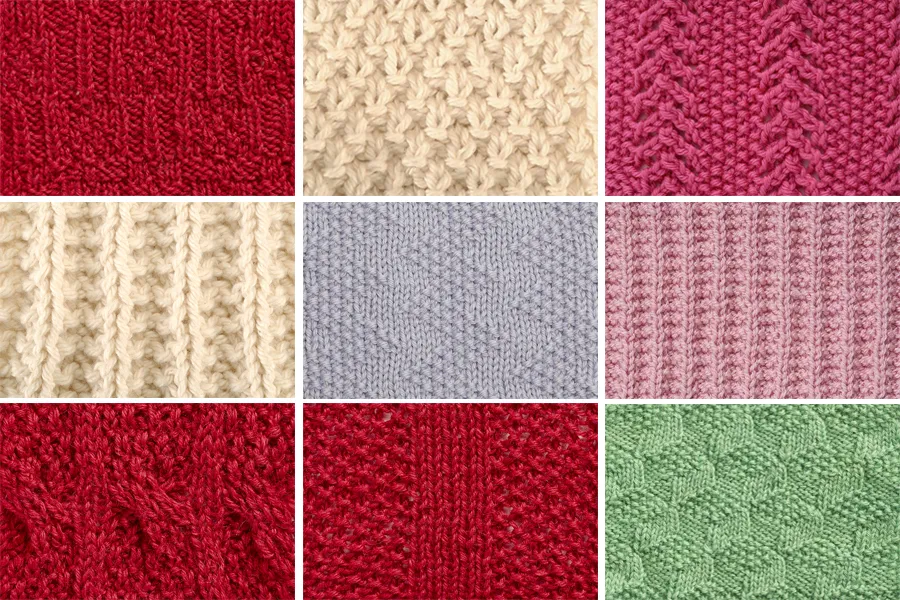
Here’s what you’ll find in our moss stitch knitting pattern library:
- Chequerboard
- Double moss stitch
- Lace and moss stitch
- Moss stitch rib version 1
- Moss stitch rib version 2
- Moss stitch zigzag
- Raised moss stitch rib
- Speckled cables
- Textured cubes
Chequerboard
Cast on a multiple of 12 sts plus 7.
Row 1 (RS) K3, P1, K3, *P2, K1, P2, K3, P1, K3; rep from * to end.
Row 2 and all WS rows K the K sts and P the P sts.
Row 3 K2, P1, K1, P1, K2, *P2, K1, P2, K2, P1, K1, P1, K2; rep from * to end.
Row 5 (K1, P1) 3 times, K1, *P2, K1, P2, (K1, P1) 3 times, K1; rep from * to end.
Row 7 K2, P1, K1, P1, K2, *P2, K1, P2, K2, P1, K1, P1, K2; rep from * to end.
Row 9 K3, P1, K3, *P2, K1, P2, K3, P1, K3; rep from * to end.
Row 11 (K1, P2) twice, *K3, P1, K3, P2, K1, P2; rep from * to last st, K1.
Row 13 (K1, P2) twice, *K2, P1, K1, P1, K2, P2, K1, P2; rep from * to last st, K1.
Row 15 (K1, P2) twice, *(K1, P1) 3 times, (K1, P2) twice; rep from * to last st, K1.
Row 17 (K1, P2) twice, *K2, P1, K1, P1, K2, P2, K1, P2; rep from * to last st, K1.
Row 19 (K1, P2) twice, *K3, P1, K3, P2, K1, P2; rep from * to last st, K1.
Row 20 K the K sts and P the P sts.
Rows 1–20 form pattern.
Double moss stitch knitting (American moss stitch)
Odd number of stitches
Cast on an odd number of stitches. (Try 21 sts.)
Row 1 K1, *P1, K1; rep from * to end.
Row 2 P1, *K1, P1; rep from * to end.
Row 3 As row 2.
Row 4 As row 1.
Repeat these 4 rows to desired length.
Even number of stitches
Cast on an even number of stitches. (Try 22 sts.)
Row 1 *K1, P1; rep from * to end.
Row 2 As row 1.
Row 3 *P1, K1; rep from * to end.
Row 4 As row 3.
Repeat these 4 rows to desired length.
Lace and moss stitch
Cast on a multiple of 10 sts plus 5 sts. (Try 45 sts.)
Row 1 (RS) K1, (P1, K1) twice, *yo, ssk, K1, k2tog, yo, K1, (P1, K1) twice; rep from * to end.
Row 2 K1, (P1, K1) twice, *P5, K1, (P1, K1) twice; rep from * to end.
Row 3 K1, (P1, K1) twice, *K1, yo, sl 1, k2tog, psso, yo, K2, (P1, K1) twice; rep from * to end.
Row 4 K1, (P1, K1) twice, *P5, K1, (P1, K1) twice; rep from * to end.
Rep rows 1-4 to form pattern.
Moss stitch rib version 1
Cast on a multiple of 4 stitches plus 1. (Try 21 sts.)
Row 1 (RS) K2, (P1, K3) to last 3 sts, P1, K2.
Row 2 P1, (K3, P1) to end.
Repeat these 2 rows to desired length.
Moss stitch rib version 2
Here, reverse stocking stitch columns are replaced by moss stitch for a pleasing texture.
Cast on a multiple of 11 sts + 5.
Row 1 K5, *(K1, P1) 3 times, K5; rep from * to end.
Row 2 *P5, (P1, K1) 3 times; rep from * to last 5 sts, P5.
Moss sitch zigzag
Cast on a multiple of 10 sts. (Try 30 sts.)
Row 1 (RS) *K5, (P1, K1) twice, P1; rep from * to end.
Row 2 P1, *(K1, P1) twice, K1, P5; rep from * to last 9 sts, (K1, P1) twice, K1, P4.
Row 3 K3, *(P1, K1) twice, P1, K5; rep from * to last 7 sts, (P1, K1) twice, P1, K2.
Row 4 P3, *(K1, P1) twice, K1, P5; rep from * to last 7 sts, (K1, P1) twice, K1, P2.
Row 5 K1, *(P1, K1) twice, P1, K5; rep from * to last 9 sts, (P1, K1) twice, P1, K4.
Row 6 *P5, (K1, P1) twice, K1; rep from * to end.
Row 7 K1, *(P1, K1) twice, P1, K5; rep from * to last 9 sts, (P1, K1) twice, P1, K4.
Row 8 As Row 4.
Row 9 As Row 3.
Row 10 As Row 2.
Repeat Rows 1-10 to desired length.
Raised moss stitch rib
Cast on a multiple of 4 sts. (Try 20 sts.)
Row 1 *K3, P1, repeat from * to end of row.
Row 2 *K2 ,P1, K1, repeat from * to end of row.
Repeat these 2 rows to desired length.
Speckled cables
Cast on a multiple of 12 sts.
Row 1 (RS) K1, (K1, P1) 5 times, K1.
Row 2 P1, (K1, P1) 5 times, P1.
Row 3 K1, (P1, K1) 5 times, K1.
Row 4 P1, (P1, K1) 5 times, P1.
Repeat rows 1–4 three more times.
Row 17 K1, (K1, P1) 5 times, K1.
Row 18 P1, (K1, P1) 5 times, P1.
Row 19 K1, Tw10, K1.
Row 20 P1, (P1, K1) 5 times, P1.
Rows 1–20 form pattern.
Textured cubes
This funky tessellated pattern cleverly combines stocking stitch, reverse stocking stitch, and moss stitch to create a series of interlinked 3D squares.
Cast on a multiple of 10 sts. (Try 40 sts.)
Row 1 (RS) (P1, K1) 5 times.
Row 2 (WS) P2, (K1, P1) 3 times, K2.
Row 3 P3, (K1, P1) twice, K3.
Row 4 P4, K1, P1, K4.
Rows 5 and 6 P5, K5.
Row 7 K1, P4, K4, P1.
Row 8 P1, K1, P3, K3, P1, K1.
Row 9 K1, P1, K1, P2, K2, P1, K1, P1.
Row 10 (P1, K1) 5 times.
Row 11 (K1, P1) 5 times.
Row 12 P1, K1, P1, K2, P2, K1, P1, K1.
Row 13 K1, P1, K3, P3, K1, P1.
Row 14 P1, K4, P4, K1.
Rows 15 and 16 K5, P5.
Row 17 K4, P1, K1, P4.
Row 18 K3, (P1, K1) twice, P3.
Row 19 K2, (P1, K1) 3 times, P2.
Row 20 (K1, P1) 5 times.
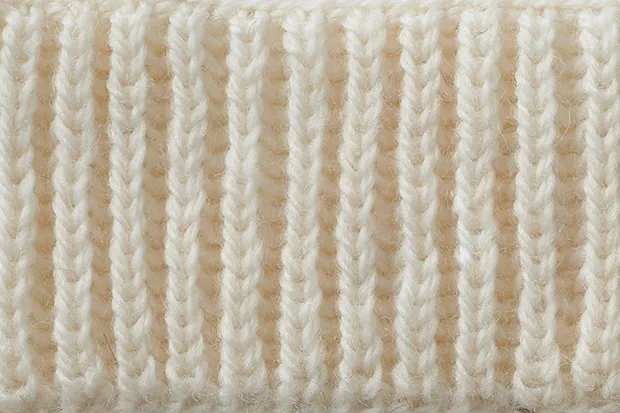
Get ready for rib stitch
If you like moss stitch, make sure you try rib stitch too. Follow our expert guide to expand your skills.
How to knit moss stitch
You can knit basic moss stitch on an odd or even number of stitches. Cast on an odd number of stitches, work K1, P1 to the end of the row, finishing with a knit stitch. Start the next row with a knit stitch, so that your fabric shows purl ‘bumps’ above and below every ‘V’ stitch.
If you cast on an even number of stitches you’d K1, P1 on the first row, then start the second row with a purl stitch. Repeat these rows and keep checking to make sure the knit Vs and the purl bumps are in the right positions. Moss stitch will take a little longer to knit, so practise with chunky yarn and big needles.
You can use any yarn for moss stitch, but a smoother one will give you better stitch definition and show off all those neat knits and purls. Don't let all your hard work get lost under fluffy fibres!
The close, balanced arrangement of knit and purl stitches creates a relatively thick fabric that lies flat, so moss stitch is ideal for borders, edgings, necks and cuffs, where you don’t want the curl of stocking stitch or the stretch of a rib.
It’s also strong and very hard-wearing, so accessories and garments that are going to get a lot of use will work well in moss stitch. For this reason it's ideal for children's knitting patterns.
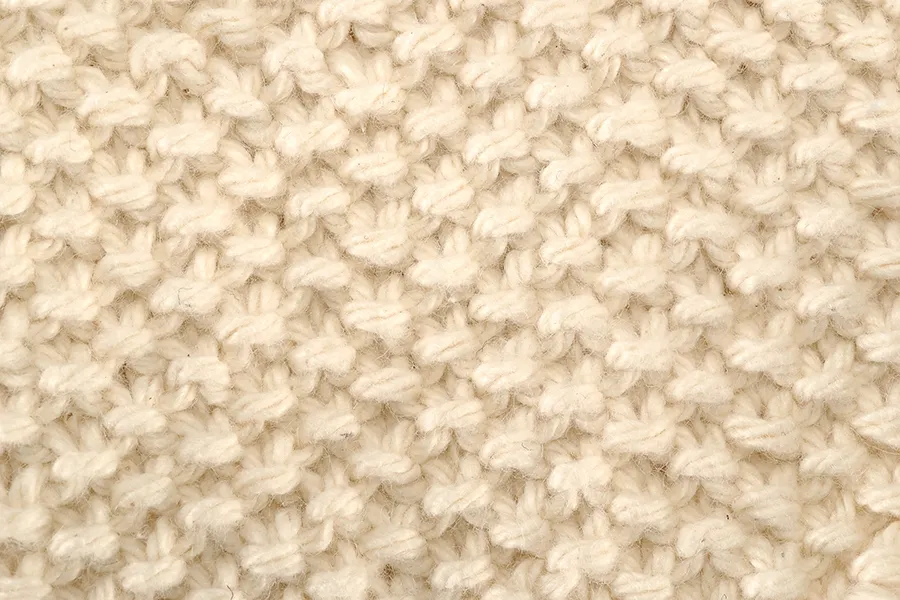
Here's what the patterns look like:
Moss stitch (odd number of stitches)
Row 1 K1, *P1, K1; rep from * to end.
Rep row 1 to form pattern.
Moss stitch (even number of stitches)
Row 1 *K1, P1; rep from * to end.
Row 2 *P1, K1; rep from * to end.
Rep rows 1 & 2 to form pattern.
